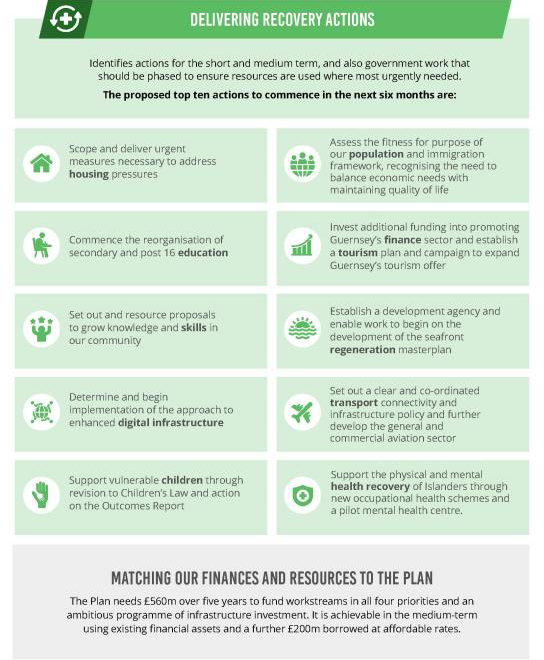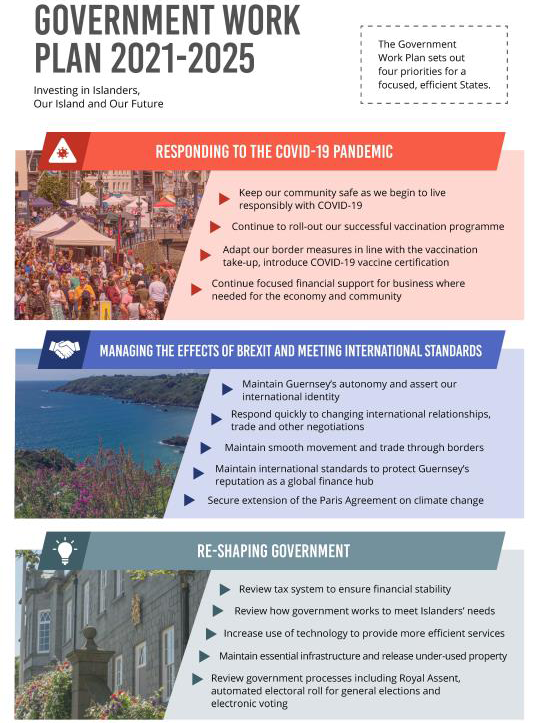Sark still waiting for it’s own Island plan
May 20th 2022
SARK IS STILL WAITING FOR ITS OWN ISLAND PLAN
Guernsey’s States of Deliberation agreed a ‘Government Work Plan’ (GWP) (Government Work Plan | States Of Guernsey (ourfuture.gg) after the 2020 election; whereby in previous years various initiatives, capital projects and miscellaneous schemes were so numerous that they were unable to be progressed in an appropriate time nor possibly in a financially prudent manner. The States subsequently agreed that.
‘… what was needed was a single, integrated, phased and funded Government Work Plan to address the Island’s immediate economic, social and environmental needs and position Islanders for a thriving, sustainable future. It has four Priorities:
Responding to the COVID-19 pandemic- an ongoing ‘must-do’ activity as the Island transitions to living with COVID-19.
Managing the effects of Brexit and meeting international standards- also an essential priority area – our jurisdiction’s autonomy, international identity and adherence to international obligations must be maintained within the changed global landscape.
Delivering the recovery actions– focusing on complementary actions that government should progress to best facilitate the Island’s recovery from the pandemic.
Re-shaping government– centred on those actions which will make the greatest contribution towards a more effective and affordable form of government and a more community-focused public service.’
This full website – #OurIslandOurFuture:Our Island, Our Future | States Of Guernsey – also encompasses other major aspects of life on Guernsey including the ongoing Tax Review, Public Service Reform, ESC Transformation (Education, Sport & Culture) as well as news on the proposed modernisation of the Princess Elizabeth Hospital.
Guernsey’s Policy & Resources Committee recently updated Bailiwick residents on the GWP by the publication of its Annual Monitoring Report which:
‘… now assists the States in making sure they use funds and people for maximum impact. Importantly, it sets out an annual list of priority recovery actions which will evolve over the political term as each action is successfully concluded and
the Assembly determines the next most critical actions for its attention.’
The monitoring report confirmed the top ten recovery actions identified in 2021 as:
Housing – scope and deliver urgent measures necessary to address housing pressures;
Education – commence the re-organisation of secondary and post-16 education pressures;
Skills – set out and resource proposals to grow knowledge and skills in our community;
Digital Infrastructure – determine and begin implementation of the approach to enhanced digital infrastructure;
Children – support vulnerable children through revision to the Children Law and action on the Outcomes Report;
Population – assess the fitness for purpose of our population and immigration framework while recognising the need to balance economic needs while maintaining quality of life;
Finance and Tourism – invest additional funding into promoting Guernsey’s finance sector and establish a tourism plan and campaign to expand Guernsey’s tourism offer; Regeneration – establish a Development
Agency and enable work to begin on the development of the seafront masterplan
Transport – set out a clear and coordinated transport connectivity and infrastructure policy and further develop the
general and commercial aviation sector;
Health Recovery – support the physical and mental recovery of Islanders through scoping and delivering SOHWELL (supporting occupational health & wellbeing) phase 3 programme and launching the pilot wellbeing centre jointly with third sector partners.
A recent Guernsey Press interview with Deputy Heidi Soulsby, Vice-President of its Policy & Resources Committee, confirmed that an essential need was somewhere to live, and that housing will be one of the first agenda items at the June meeting. This included:
‘Addressing capacity and affordability in the private housing market, supplying adequate key worker housing and managing the stock of States’ housing are the three strands of work identified as urgent.’
Sark’s neighbouring Island has been able to identify and prioritise actions that will improve the future of Guernsey and its residents and is monitoring its progress rather than working in the abstract. Sark’s neighbouring Island of Alderney announced in October 2021 its similar aim of drafting an ‘Island Plan’; in its press release at the time, the States of Alderney confirmed:

‘A draft ‘Island Plan’ aimed at maximising Alderney’s prosperity, resilience and sustainability is to be placed before the community in a public consultation process before being finalised and presented to the full States, probably in November.
The finished Plan, set at a strategic level, is aimed at a range of audiences such as potential investors, immigrant workers, relocating businesses and visitors intrigued about the Island’s potential.
Above all, it will focus elected Members, civil servants and business leaders on the Island’s ‘direction of travel’ over the coming years and so provide the continuity of action based on rigorous strategic planning principles, underpinned with a greater degree of financial certainty.’
Key themes identified included economy, energy, accessibility and connectivity, community development, natural and manmade environmental goals and good governance.
The final draft plan was presented to The States of Alderney’s meeting held on 12th January 2022; the details can be found at: Billet d’Etat 12 January 2022 – States of Alderney (gov.gg)
Following the introduction, Alderney’s Strategic Plan confirms its Vision Statement
‘The Island Plan’s overall aim is to ensure that we maximise our prosperity and resilience, and in so doing, become a more sustainable Island with excellent accessibility/connectivity, a vibrant economy, a happy, healthy community; and a community which values and protects its unique heritage and natural environment as an autonomous member of the Crown Dependencies.’
Alderney has greater support through its constitutional relationship with Guernsey, but it faces similar challenges to that of Sark: housing, diversification of the economy, an aging population and connectivity, to name but a few.
Sark’s population appears to be politically apathetic in recent years; there has been no contested election since 2018, and before that, 2013. Perhaps now is the time to revisit an Island-wide consultation on the future of Sark? One thing is certain in these uncertain times, and that is the need for Chief Pleas to demonstrate that it is working towards a universally accepted strategic plan.
This article first appeared in the Sark Newspaper : May 20th 2022

